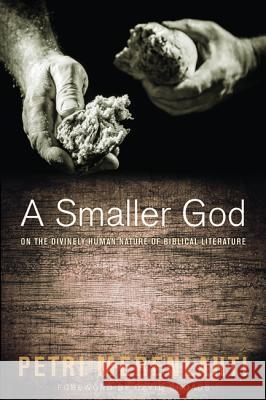A Smaller God » książka
A Smaller God
ISBN-13: 9781625644107 / Angielski / Miękka / 2014 / 134 str.
A Smaller God
ISBN-13: 9781625644107 / Angielski / Miękka / 2014 / 134 str.
(netto: 72,20 VAT: 5%)
Najniższa cena z 30 dni: 74,97
ok. 16-18 dni roboczych.
Darmowa dostawa!
The Bible is a perplexing book. It blends primitive beliefs with timeless truths, swings between compassionate love and ruthless violence, and forms a sympathetic heavenly father from the remains of a savage tribal god. What are we to make of it all? Petri Merenlahti takes an entertaining journey through biblical literature and returns with an original theology of imperfection. Looking at the Bible through the lenses of history, culture, literature, and psychology, he calls his readers to let go of an idealized image of the Christian Scriptures and embrace their limited human nature instead. This is vital, he argues, because false idealization and psychological splitting are major sources of religious fanaticism and violence. Merenlahti insists that we make a difference between the smaller God of human imagination and the transcendent God that should remain beyond it. We will then be rewarded with wisdom instead of fanaticism, mercy instead of moralism, and peace instead of hatred and guilt. ""Merenlahti has written a very useful book that will please, instruct, reassure, and counsel every preacher and person in the pew. It is a dose of good medicine for those who, having declared their being spiritual but no longer religious, are in danger of sliding down the slippery slope into a pooling of mutual ignorance. . . . This book offers much enticing illumination to those who long for a meaningful walk with God in this journey of human life."" --J. Harold Ellens, University of Michigan, Ann Arbor, MI ""Writing from an innovative hub of biblical scholarship in Finland, Petri Merenlahti offers us a historical, literary, cultural, and psychological page-turner. Echoing the mid-20th century 'discovery' of the 'humanity of Jesus, ' Merenlahti urges a 21st century 'discovery' of the 'humanity of Scripture.' He calls forth the testimony from rabbinic, Christian, and secular traditions on the shadowy human dimensions of Scripture, but simultaneously on the light it provides from and for the soul."" --Wayne G. Rollins, Hartford Seminary, Hartford, CT Petri Merenlahti is Postdoctoral Researcher at the University of Helsinki and Chief Theological Advisor at Finn Church Aid, a humanitarian agency affiliated with the Evangelical Lutheran Church of Finland. He is the author of Poetics for the Gospels? Rethinking Narrative Criticism (2002).
The Bible is a perplexing book. It blends primitive beliefs with timeless truths, swings between compassionate love and ruthless violence, and forms a sympathetic heavenly father from the remains of a savage tribal god. What are we to make of it all?Petri Merenlahti takes an entertaining journey through biblical literature and returns with an original theology of imperfection. Looking at the Bible through the lenses of history, culture, literature, and psychology, he calls his readers to let go of an idealized image of the Christian Scriptures and embrace their limited human nature instead. This is vital, he argues, because false idealization and psychological splitting are major sources of religious fanaticism and violence.Merenlahti insists that we make a difference between the smaller God of human imagination and the transcendent God that should remain beyond it. We will then be rewarded with wisdom instead of fanaticism, mercy instead of moralism, and peace instead of hatred and guilt.""Merenlahti has written a very useful book that will please, instruct, reassure, and counsel every preacher and person in the pew. It is a dose of good medicine for those who, having declared their being spiritual but no longer religious, are in danger of sliding down the slippery slope into a pooling of mutual ignorance. . . . This book offers much enticing illumination to those who long for a meaningful walk with God in this journey of human life.""--J. Harold Ellens, University of Michigan, Ann Arbor, MI""Writing from an innovative hub of biblical scholarship in Finland, Petri Merenlahti offers us a historical, literary, cultural, and psychological page-turner. Echoing the mid-20th century discovery of the humanity of Jesus, Merenlahti urges a 21st century discovery of the humanity of Scripture. He calls forth the testimony from rabbinic, Christian, and secular traditions on the shadowy human dimensions of Scripture, but simultaneously on the light it provides from and for the soul.""--Wayne G. Rollins, Hartford Seminary, Hartford, CTPetri Merenlahti is Postdoctoral Researcher at the University of Helsinki and Chief Theological Advisor at Finn Church Aid, a humanitarian agency affiliated with the Evangelical Lutheran Church of Finland. He is the author of Poetics for the Gospels? Rethinking Narrative Criticism (2002).











